CEO Lee of Uclone keeps these remarks in heart.
“I am pleased to see President Mirziyoyev again. He is like a brother to me. He is leading Uzbekistan’s new development with reform policies across all sectors, including politics, the economy and society, and I sincerely respect President Mirziyoyev who is attracting global attention. President Mirziyoyev and I agreed to upgrade bilateral relations between our two countries to a special strategic partnership.” (See full details at the end of this report.)
This statement made by Moon during his visit to Uzbekistan on April 10, last year is kept in heart by CEO and Chairman Lee Byoung-chul of Uclone Inc. in Seoul, which is a City Gas Smart Grid Agency in Korea.
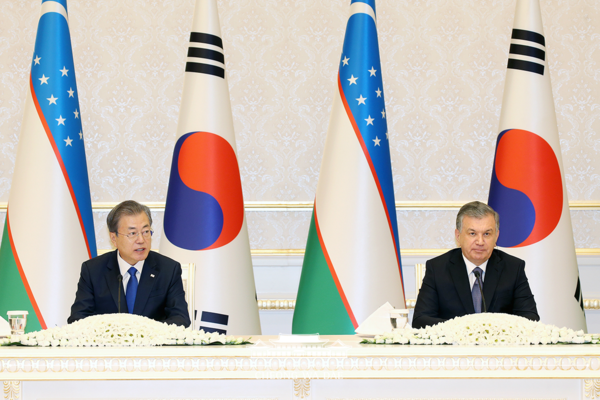
Lee takes strong interest in the promotion of economic cooperation between Korea and Uzbekistan, and takes personal interest in the enhancement of friendship and affinity between the two peoples through active participation in win-win business cooperation between the two countries.
The Uclone Inc. headed by Lee specializes in a wide variety of businesses, especially in the water and gas meters, particularly the advanced metering infrastructure (AMI) systems.
In fact, Lee has been working on a project to supply Gas AMI and Water Meter & AMI to Uzbekistan since about two years ago. (AMI, which is an advanced concept than Automatic Meter Reading, is an advanced metering infrastructure).
Lee’s company owns and operates several businesses, including Uclone, Inc., SNS Korea, Inc., Gas Keeper, Inc., AND, Inc. He is involved in businesses related to AMI, including Gas/Water AMI, Gas Volume Corrector, in Seoul and various provinces in Korea.
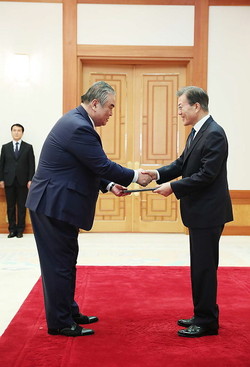
In cooperation with the National Association of Apartment Residents and the City Gas Users Association, Lee carries out Gas/Water Meter & AMI supply projects in Korea. He is known to have received requests from Indonesia and a number of other countries.
According to reports, not long ago, the launch of Samsung Group's semiconductor business, the operation of Pohang Iron & Steel Co. and the launch of a Korean-made passenger car were selected as the “quantum jump moments” of the 100 years of Korean businesses by major Korean news agencies and professionals in various fields.
In addition, many miraculous things have occurred intensively in Korea, where people had been asleep for the past 500 years and had been struggling for 50 years. It was a series of modernization and industrialization processes, and as a result, Korea was placed in the ranks of industrialized countries. Korean baby boomers stood at the forefront of industrialization and rapid growth.
Global baby boomers began in 1945, after the end of World War II, but in Korea, they began in the mid-1950s after the end of the Korean War. They did their studies in a relatively stable economic environment while the preceding generation struggled under the tough conditions of post-war industrialization to escape the poverty of relying on foreign aid. They made their way into society and industry in the late 1970s and early 1980s when Korea entered an explosive period of growth.
Some baby boomers had earlier completed technology and function-oriented education and advanced to the industry at an early age and played a basic role in Korea's industrialization as skilled engineers in each field. Others played a role in leading Korea's rapid growth by finishing college education and advancing into the industrial, financial, medical and academic sectors.
Since 30 to 40 years had elapsed, Korea's economic scale has grown tens of times to become one of industrialized countries. These baby boomers are slowly retiring from various fields they have been in. But they are still active, motivated and full of power. Nevertheless, they are giving way to their successors and looking for life after retirement in many ways with lingering worry.
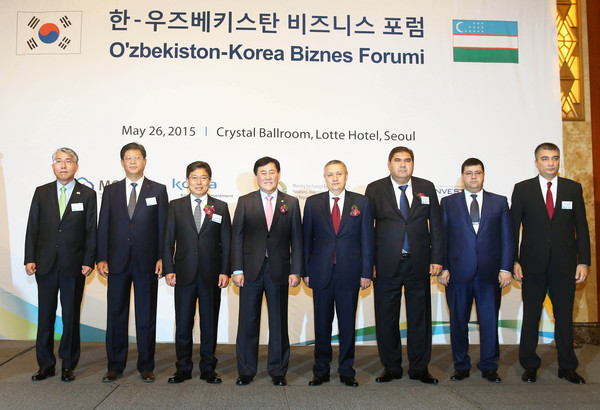
Here is a brief account of business experience of Chairman Lee:
After graduating from Choong-Ang High School in Seoul in late 1970s, Lee completed his bachelor's degree course in chemical engineering at Seoul National University, and earned a master's degree in chemical engineering from Korea Advanced Institute of Science and Technology (KAIST) in early 1980s.
At that time, the largest number of classmates have made inroads into the industrial sector and contributed to the rapid growth of large corporations, and no less, many alumni have advanced to academia and are still engaged in research and lectures at universities.
Of note, Lee chose to start his own business just five years after graduating from KAIST, and despite considerable ups and downs, he still runs companies specializing in gas/water advanced metering infrastructure (AMI).
After graduating from KAIST, Lee worked for Miwon Commercial Co., a small and medium-sized company run by his senior, for about five years, and developed several Fine Chemical Products. In the early 1980s, it was a small company with only tens of billions of won in sales revenue, but now it has 1 trillion won in total revenue and even made its way into overseas markets. Among Miwon products, those developed by Lee and Fine Chemical Products derived from them make up a considerable proportion.
Wrapping up his new product development business at Miwon Commercial, in 1989, Lee established an engineering company to design and manufacture Fine Chemical Plant and Pilot Plant, contributing to the advancement of Korea's small plant engineering technology. Employees who worked for Lee’s company started multiple related companies, becoming the backbone of small-scale industrial engineering field in Korea.
In the late 1990s, Lee transferred the Plant Engineering project management to his employees and developed Low-temperature Plasma Coating Technology and applied it to molds for semiconductor production. But he had to fold the project due to numerous difficulties, such as the financial crisis, a national disaster that no one could avoid at the time.
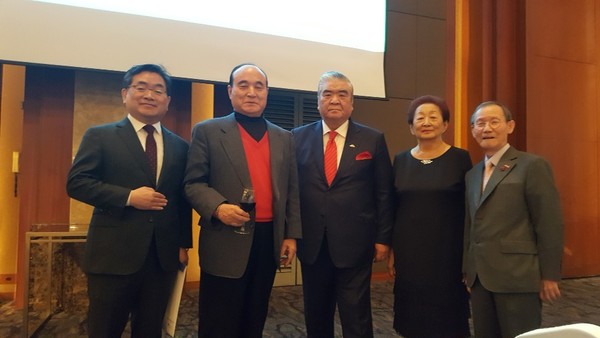
During this time, Lee began to develop new technologies through industry-academic cooperation, as a professor of chemistry and engineering at Gachon University. One of the technologies which he developed is the Gas Volume Corrector, which is used for city gas, and applied this to IoT (Internet of Things) technology. He also developed City Gas AMI and Water AMI. He is currently carrying out a project to distribute the product line centered on this technology to households and buildings nationwide.
While Lee Byoung-chul was in business, the alumni were also active in various fields. Dozens of high school alumni have advanced to the medical field as specialists. Among them, several friends become outstanding doctors, and some others became executives and CEOs of large corporations, and almost all universities have his alumni as professors. There are a number of high-ranking officials who are associated with the Ministry of Trade, Industry and Energy, the Ministry of Land, Infrastructure and Transport, the Ministry of Economy and Finance and Korea Intellectual Property Office.
There are also other high-ranking officials of the finance sector and legal profession, such as Supreme Court. Close seniors and juniors are leading Korea's rapid growth in almost every field
Lee is currently looking at Central Asia. He offered advice on plant engineering to Park Young-hwan, a high school alumnus who is in charge of the “Textile Techno Park” project in Uzbekistan, after he briefed a Uzbekistan inspection team of the Utility (Gas, Water, Electric) Automatic Metering Reading (AMR) about AMI (Advanced Metering Infrastructure) at the request of the Korean government (Ministry of Trade, Industry and Energy) in the summer of 2016.
Lee has since visited Uzbekistan several times for various purposes, including provision of technical help to Korean companies planning to supply Gas AMI to Uzbekistan, and experienced the familiarity and willingness of local people to develop the economy. As if it were the situation in Korea that started industrialization in the late 1970s, he felt the desire and difficulty of the government and government officials who were leading the industrialization at the same time. He thought that it would be worthwhile if Uzbekistan could succeed in industrialization like Korea and he plays a role in the process.
Recently, Lee proposed that the government carry out the Uzbekistan government-initiated Water AMI and Gas AMI in cooperation with Korean financial institutions. This project aims to contribute to the development of Uzbekistan's basic industries by producing necessary water meter, gas meter and communication modules locally. It also decided to minimize Uzbekistan's financial burden by carrying out such projects in a Build, Operate & Transfer (BOT) manner in cooperation with Korean financial institutions
He is also discussing with friends in the medical community in Korea about the establishment of hospitals and medical schools to satisfy the increasing demand for advanced medical services. In early 2020, he will move to set up an "Kor-Uz Industrial Cooperation Group" (tentative name) with more than 10 medical alumni to promote cooperation with local hospitals and medical schools. After the alumni visit Uzbekistan, they will officially launch the medical assistance group to carry out projects in cooperation with local university hospitals and financial institutions.
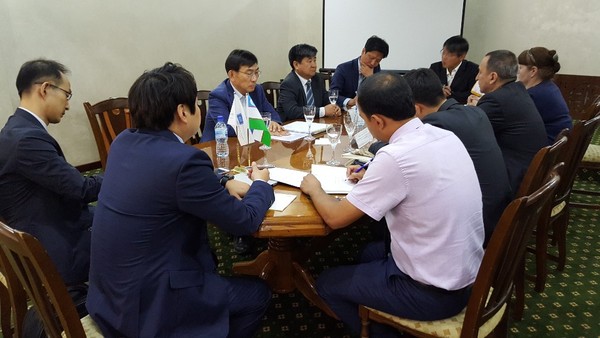
In addition, whenever he meets friends in the industry and financial sector, he sends a message to inform Uzbekistan's desire to industrialize and support their effort. A number of friends who have not been familiar with Central Asia and Uzbekistan would express agreement. Some of them are said to be interested in investing in infrastructure centered on civil engineering and construction, while others are said to be thinking about a JV (Joint Venture)-style chemical plant. In particular, when Lee would link the history of Central Asia to that of Northeast Asia and talk about climate and national character, most alumni agree with him
They consider this activity as a new and rewarding way of life after retirement. If their activity continues to spread to baby boomers who have already retired or are about to retire, it will be one of the new trends in their post-retirement lives, at least in Korea.
Armed with high education levels and diligence inherited from the preceding generation during Korea's industrialization and high growth, Korean baby boomers have jumped ahead. Now they are going to hand over Korea’s steady development efforts to the younger generation and go abroad in search of new value while carrying tangible and intangible assets they have accumulated so far. The first destination is probably remote but friendly Uzbekistan with Tashkent and Samarkand, among others, the center of the Silk Road.
Notes:
(1) Park Young-hwan successfully carried out the project while working at the Korea Institute of Industrial Technology, and since his recent retirement, he has received similar requests from Tanzania, Guatemala and other countries and has been making efforts to build research centers and factories related to the textile industry at his own expense.
(2) It is of great interest to explain the history of Northeast Asia to friends who are aware of Korea's important position, but not specifically.
(3) In Uzbekistan, the temperature is warmer than Korea, and in the summer, dry and growing plants are similar. The people are neat and cheerful, and Koreans get interested in Uzbekistan when they are told that its people are very friendly to Korea.
About Lee Byoung-chul:
Lee Byoung-chul has been working on a project to supply Gas AMI and Water Meter & AMI to Uzbekistan since about two years ago. (AMI, which is an advanced concept than Automatic Meter Reading, is an Advanced Metering Infrastructure)
Lee is a businessman who is doing the following projects:
The company owns and operates several businesses including Uclone, Inc., SNS Korea, Inc., Gas Keeper, Inc., AND, Inc.. He is involved in businesses related to AMI, including Gas/Water AMI, Gas Volume Corrector, in Seoul and provinces.
In cooperation with the National Association of Apartment Residents and the City Gas Users Association, Lee carries out Gas/Water Meter & AMI supply projects in Korea. He received requests from Indonesia and other countries.
Lee Byoung-chul is reorganizing the companies he owns and operates. He is also moving to take over a gas meter company and a water meter company.
Speech by President Moon Jae-in at Korea-Uzbekistan summit on April 19, 2019:
Assalam Alaikum (Good morning)!
I am truly grateful to President Mirziyoyev and the people of Uzbekistan for warmly welcoming me and my delegation.
I am pleased to see President Mirziyoyev again; he is like a brother to me. Your Excellency is leading Uzbekistan’s new development with reform policies across all sectors, including politics, the economy and society. I sincerely respect President Mirziyoyev who is attracting global attention.
President Mirziyoyev and I agreed to upgrade bilateral relations between our two countries to a special strategic partnership and discussed concrete implementation plans.
First, we agreed to make efforts for the promotion of friendship between our two peoples.
During his visit to Korea in 2017, President Mirziyoyev said that culture is the most important element in bilateral relations because it can bring us closer.
We also reached agreement to expand cultural exchanges and work together to preserve cultural heritage in Uzbekistan, including the Afrosiab mural.
The House of Korean Culture and Arts, which is to open tomorrow, will become a venue for cultural exchanges and a symbol of the friendship between our two countries. I express my appreciation to President Mirziyoyev for attending the opening ceremony with me.
Second, we agreed to continue our efforts to identify and push ahead with concrete, substantive cooperative projects.
We also reached agreement to improve relevant laws and institutions to help further expand bilateral trade, which reached a record high last year. As a first step, the agreement on the promotion and mutual protection of investments as well as the double taxation avoidance agreement were amended, and I hope this will go a long way toward the stable operation of our two countries' businesses.
We concurred on conducting a joint study for the conclusion of a Korea-Uzbekistan FTA and continuing to identify bilateral cooperation models that utilize our two countries' complementary industrial structures.
As part of a joint response to the era of the Fourth Industrial Revolution, we agreed to strengthen cooperation in such new industries as ICT, 5G, big data, artificial intelligence, and healthcare and medical services.
The Korea-Uzbekistan Agricultural Machinery R&D Center, which will open during this state visit, is an excellent example of mutually beneficial cooperation. The Korea-Uzbekistan center for cooperation in healthcare and medical services that our two countries have agreed to establish will help protect the health of the people and serve as a breakthrough for common prosperity.
Third, we concurred on closely working together for peace and prosperity not only on the Korean Peninsula and in Central Asia but also in the whole of Eurasia.
President Mirziyoyev has actively assisted in the Korean Government’s efforts to achieve denuclearization and permanent peace on the Korean Peninsula. Moreover, he is leading the efforts for harmony and cooperation in Central Asia. I express my support for this steadfast work toward peace.
Peace is linked to mutual prosperity. We agreed to harmoniously connect Uzbekistan’s regional cooperation strategy for Central Asia with the Korean Government’s New Northern Policy, thereby achieving common prosperity in Eurasia together.
The Korea-Central Asia Cooperation Forum has developed into a good example for multilateral collaboration and will be upgraded to a ministerial-level meeting this year to mark its 12th anniversary. We agreed to work closely together so that this forum can help further expand Korea-Central Asia cooperation.
Today’s summit will become a milestone that presents the direction of our two countries’ development. Expressing my gratitude for your warm hospitality once more, I am looking forward to meeting Your Excellency again in Korea.
Rahmat! (Thank you)

